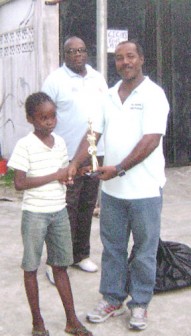The Ministry of Labour yesterday held a closing ceremony for one hundred and sixty-nine youths and thirty-five parents who were benefactors of its tackling child labour through education (TACKLE) six-week pilot project.
In collaboration with the International Labour Organisation and the International Programme on the Elimination of Child Labour – the programme targeted students living in the West and East Ruimveldt, Middle Road, Albouystown, East La Penitence and Riverview areas. The programme, which began on June 19, will conclude today with parents and students receiving trophies for exemplary dedication in a specified category, certificates and stationary kits.
Sharon Patterson, National Project Officer of the programme, stated that the project’s commencement date coincided with the World Day against Child Labour and was the brainchild of the Ministry of Education and the Ministry of Human Services and Social Security.

These ministries saw the need to create an enabling environment for children who had not performed well over the last academic year and those at risk of dropping out of school. A six-week project was drafted and implemented to teach not only life skills but sports, chess, scrabble, spiritual balancing and anger management for youths. Parents, most of whom had a child or children in the programme, were also targeted.
Patterson went on to charge the participants to dare to dream to be the best citizens Guyana can produce. She ended by saying that with the success of this pilot project it is envisioned that similar programmes will be implemented across Guyana.
Marva Williams, Assistant Chief Probation Officer with the Ministry of Home Affairs explained that students, some as young as four, were chosen since frequent absences, poverty, or an at-risk sibling were the areas focused on in selecting participants.
In addition, the programme enlisted the assistance of volunteer social workers, who would have completed the UNICEF training, to empower participants to deal with life issues. Chess and scrabble were chosen since for the former concentrating and strategising were key in winning and they could then take this learnt information and channel it into other areas of their lives. Scrabble was chosen to teach youths word recognition and reading in a game-like setting.



